Professional Ethics Report: Finance Sector Analysis
VerifiedAdded on 2021/01/02
|13
|4196
|388
Report
AI Summary
This report delves into the realm of professional ethics, specifically within the finance sector, using Standard Chartered Plc as a case study. It begins by defining professional ethics and exploring fundamental principles like integrity, objectivity, and confidentiality. The report then examines the legal, regulatory, and ethical requirements that govern the accounting and finance sector, including civil and criminal laws, and the role of professional bodies such as CIMA and ACCA. The report highlights the importance of codes of conduct for individuals, organizations, and industry sectors, as well as the risks of improper practice and opportunities for maintaining up-to-date knowledge. It also addresses ethical actions in client, supplier, and colleague relationships, the importance of objectivity, and the handling of confidential information. Furthermore, the report outlines procedures for addressing unethical behavior, including reporting mechanisms and strategies for preventing ethical conflicts. Finally, it underscores the importance of an ethical approach to sustainability and the responsibilities of finance professionals in upholding these principles. The report concludes with a summary of key findings and recommendations.
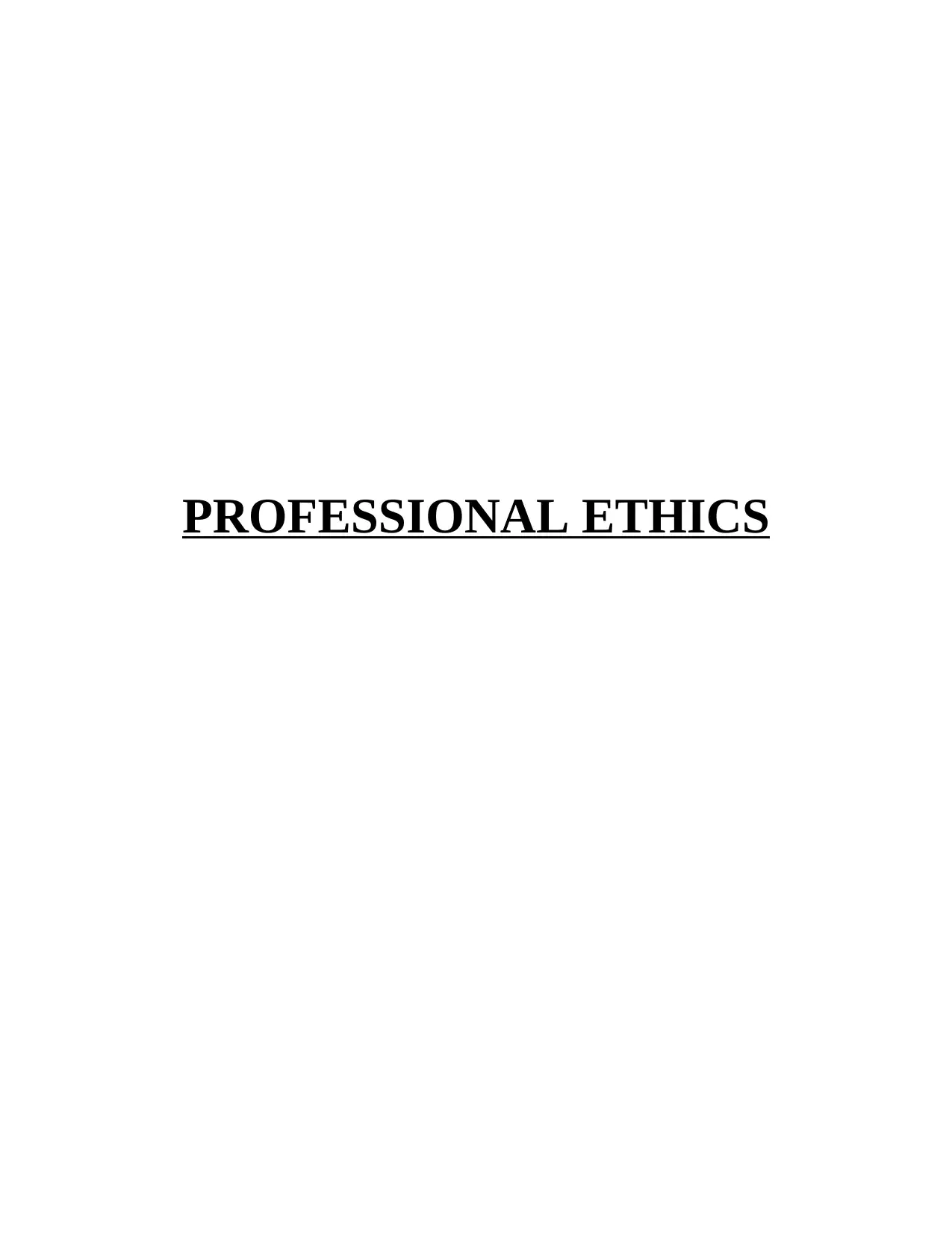
PROFESSIONAL ETHICS
Paraphrase This Document
Need a fresh take? Get an instant paraphrase of this document with our AI Paraphraser
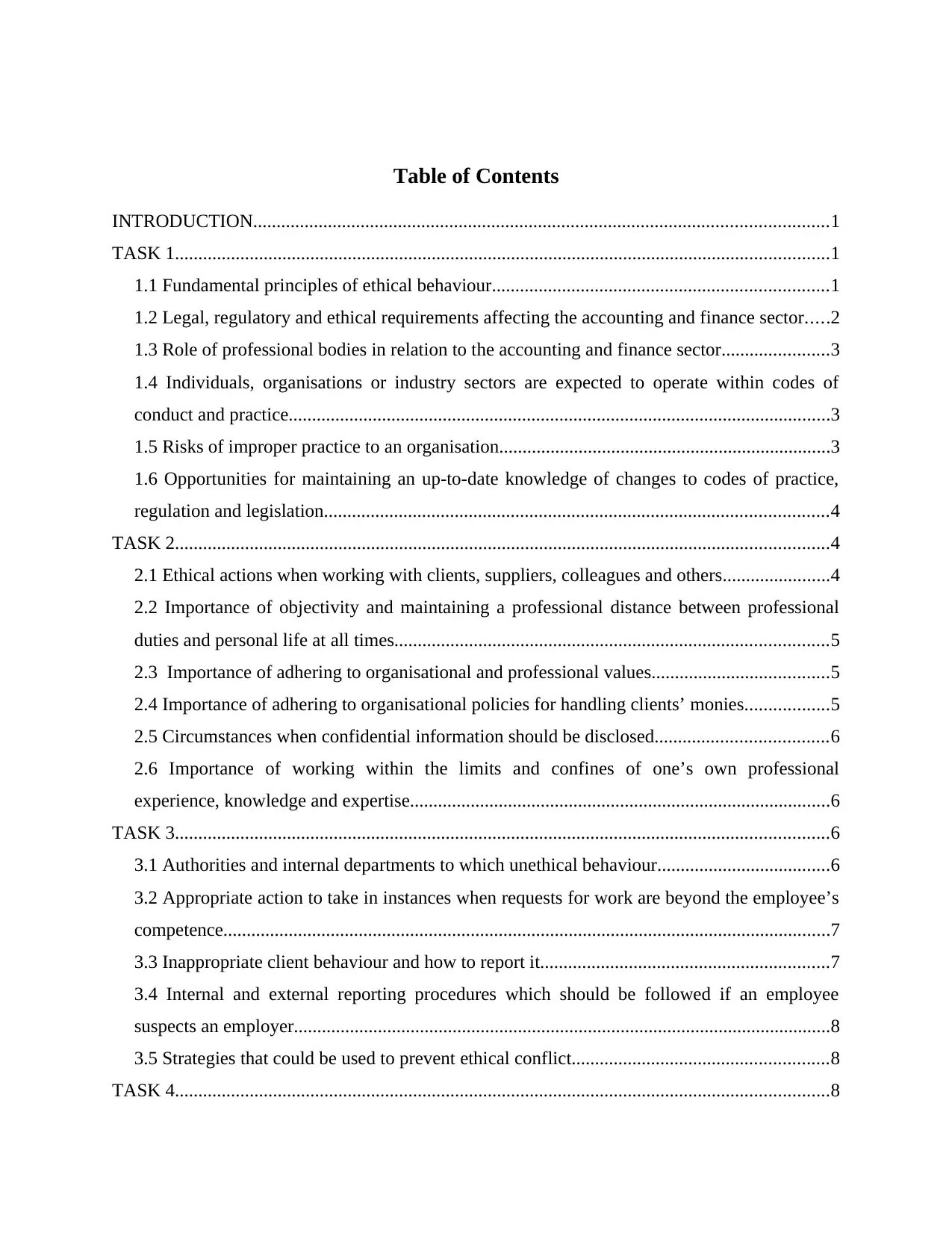
Table of Contents
INTRODUCTION...........................................................................................................................1
TASK 1............................................................................................................................................1
1.1 Fundamental principles of ethical behaviour........................................................................1
1.2 Legal, regulatory and ethical requirements affecting the accounting and finance sector.....2
1.3 Role of professional bodies in relation to the accounting and finance sector.......................3
1.4 Individuals, organisations or industry sectors are expected to operate within codes of
conduct and practice....................................................................................................................3
1.5 Risks of improper practice to an organisation.......................................................................3
1.6 Opportunities for maintaining an up-to-date knowledge of changes to codes of practice,
regulation and legislation............................................................................................................4
TASK 2............................................................................................................................................4
2.1 Ethical actions when working with clients, suppliers, colleagues and others.......................4
2.2 Importance of objectivity and maintaining a professional distance between professional
duties and personal life at all times.............................................................................................5
2.3 Importance of adhering to organisational and professional values......................................5
2.4 Importance of adhering to organisational policies for handling clients’ monies..................5
2.5 Circumstances when confidential information should be disclosed.....................................6
2.6 Importance of working within the limits and confines of one’s own professional
experience, knowledge and expertise..........................................................................................6
TASK 3............................................................................................................................................6
3.1 Authorities and internal departments to which unethical behaviour.....................................6
3.2 Appropriate action to take in instances when requests for work are beyond the employee’s
competence..................................................................................................................................7
3.3 Inappropriate client behaviour and how to report it..............................................................7
3.4 Internal and external reporting procedures which should be followed if an employee
suspects an employer...................................................................................................................8
3.5 Strategies that could be used to prevent ethical conflict.......................................................8
TASK 4............................................................................................................................................8
INTRODUCTION...........................................................................................................................1
TASK 1............................................................................................................................................1
1.1 Fundamental principles of ethical behaviour........................................................................1
1.2 Legal, regulatory and ethical requirements affecting the accounting and finance sector.....2
1.3 Role of professional bodies in relation to the accounting and finance sector.......................3
1.4 Individuals, organisations or industry sectors are expected to operate within codes of
conduct and practice....................................................................................................................3
1.5 Risks of improper practice to an organisation.......................................................................3
1.6 Opportunities for maintaining an up-to-date knowledge of changes to codes of practice,
regulation and legislation............................................................................................................4
TASK 2............................................................................................................................................4
2.1 Ethical actions when working with clients, suppliers, colleagues and others.......................4
2.2 Importance of objectivity and maintaining a professional distance between professional
duties and personal life at all times.............................................................................................5
2.3 Importance of adhering to organisational and professional values......................................5
2.4 Importance of adhering to organisational policies for handling clients’ monies..................5
2.5 Circumstances when confidential information should be disclosed.....................................6
2.6 Importance of working within the limits and confines of one’s own professional
experience, knowledge and expertise..........................................................................................6
TASK 3............................................................................................................................................6
3.1 Authorities and internal departments to which unethical behaviour.....................................6
3.2 Appropriate action to take in instances when requests for work are beyond the employee’s
competence..................................................................................................................................7
3.3 Inappropriate client behaviour and how to report it..............................................................7
3.4 Internal and external reporting procedures which should be followed if an employee
suspects an employer...................................................................................................................8
3.5 Strategies that could be used to prevent ethical conflict.......................................................8
TASK 4............................................................................................................................................8
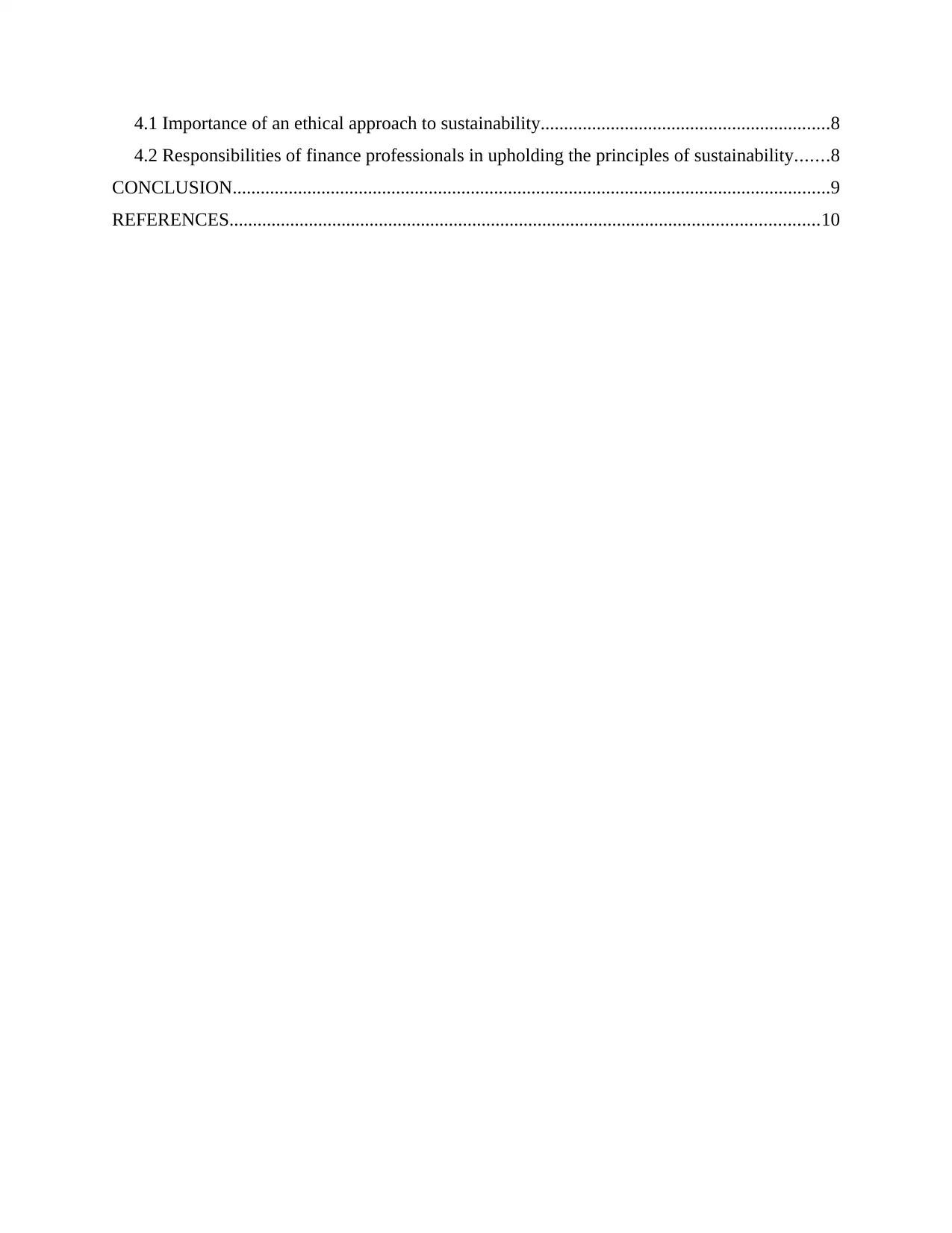
4.1 Importance of an ethical approach to sustainability..............................................................8
4.2 Responsibilities of finance professionals in upholding the principles of sustainability.......8
CONCLUSION................................................................................................................................9
REFERENCES..............................................................................................................................10
4.2 Responsibilities of finance professionals in upholding the principles of sustainability.......8
CONCLUSION................................................................................................................................9
REFERENCES..............................................................................................................................10
⊘ This is a preview!⊘
Do you want full access?
Subscribe today to unlock all pages.

Trusted by 1+ million students worldwide
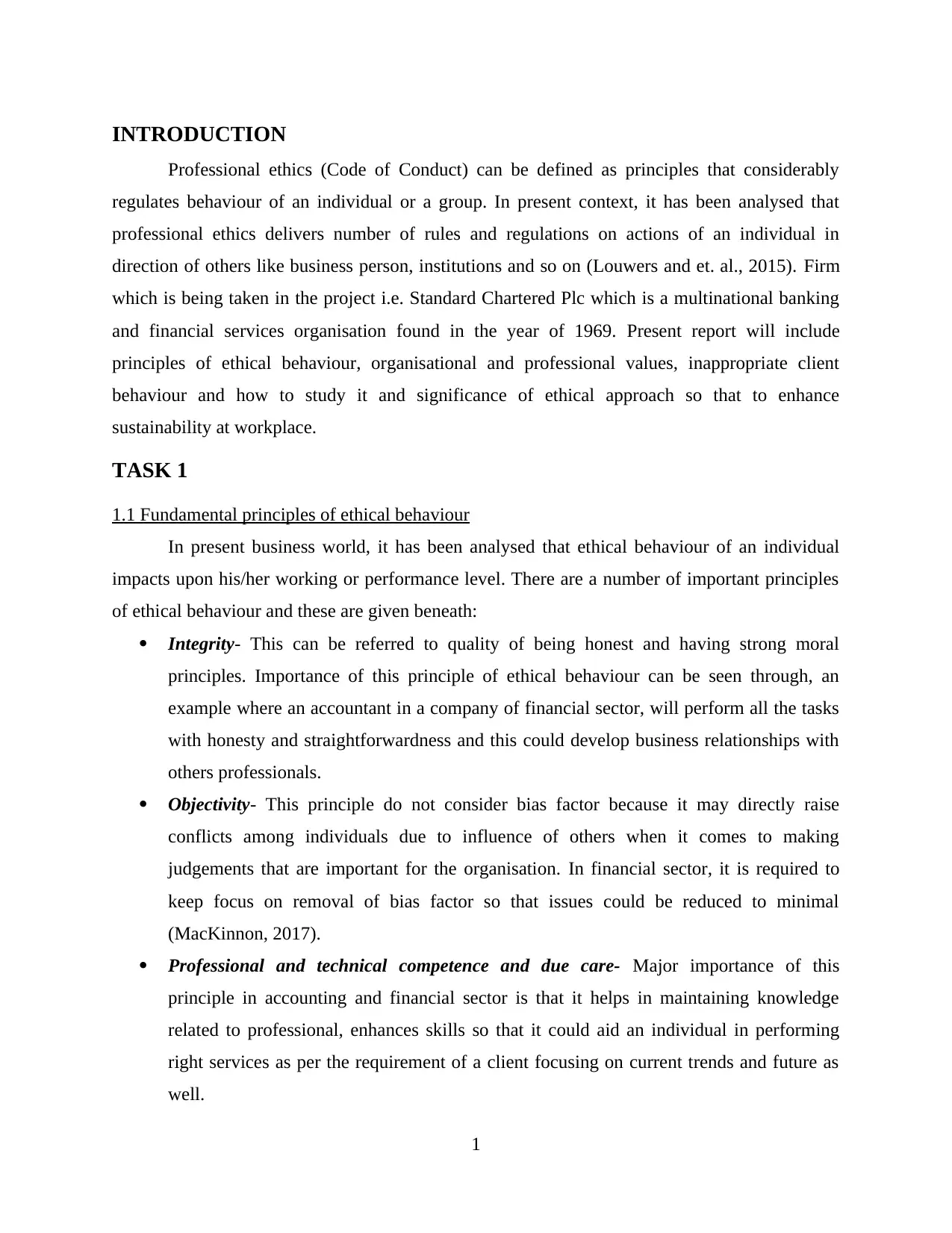
INTRODUCTION
Professional ethics (Code of Conduct) can be defined as principles that considerably
regulates behaviour of an individual or a group. In present context, it has been analysed that
professional ethics delivers number of rules and regulations on actions of an individual in
direction of others like business person, institutions and so on (Louwers and et. al., 2015). Firm
which is being taken in the project i.e. Standard Chartered Plc which is a multinational banking
and financial services organisation found in the year of 1969. Present report will include
principles of ethical behaviour, organisational and professional values, inappropriate client
behaviour and how to study it and significance of ethical approach so that to enhance
sustainability at workplace.
TASK 1
1.1 Fundamental principles of ethical behaviour
In present business world, it has been analysed that ethical behaviour of an individual
impacts upon his/her working or performance level. There are a number of important principles
of ethical behaviour and these are given beneath:
Integrity- This can be referred to quality of being honest and having strong moral
principles. Importance of this principle of ethical behaviour can be seen through, an
example where an accountant in a company of financial sector, will perform all the tasks
with honesty and straightforwardness and this could develop business relationships with
others professionals.
Objectivity- This principle do not consider bias factor because it may directly raise
conflicts among individuals due to influence of others when it comes to making
judgements that are important for the organisation. In financial sector, it is required to
keep focus on removal of bias factor so that issues could be reduced to minimal
(MacKinnon, 2017).
Professional and technical competence and due care- Major importance of this
principle in accounting and financial sector is that it helps in maintaining knowledge
related to professional, enhances skills so that it could aid an individual in performing
right services as per the requirement of a client focusing on current trends and future as
well.
1
Professional ethics (Code of Conduct) can be defined as principles that considerably
regulates behaviour of an individual or a group. In present context, it has been analysed that
professional ethics delivers number of rules and regulations on actions of an individual in
direction of others like business person, institutions and so on (Louwers and et. al., 2015). Firm
which is being taken in the project i.e. Standard Chartered Plc which is a multinational banking
and financial services organisation found in the year of 1969. Present report will include
principles of ethical behaviour, organisational and professional values, inappropriate client
behaviour and how to study it and significance of ethical approach so that to enhance
sustainability at workplace.
TASK 1
1.1 Fundamental principles of ethical behaviour
In present business world, it has been analysed that ethical behaviour of an individual
impacts upon his/her working or performance level. There are a number of important principles
of ethical behaviour and these are given beneath:
Integrity- This can be referred to quality of being honest and having strong moral
principles. Importance of this principle of ethical behaviour can be seen through, an
example where an accountant in a company of financial sector, will perform all the tasks
with honesty and straightforwardness and this could develop business relationships with
others professionals.
Objectivity- This principle do not consider bias factor because it may directly raise
conflicts among individuals due to influence of others when it comes to making
judgements that are important for the organisation. In financial sector, it is required to
keep focus on removal of bias factor so that issues could be reduced to minimal
(MacKinnon, 2017).
Professional and technical competence and due care- Major importance of this
principle in accounting and financial sector is that it helps in maintaining knowledge
related to professional, enhances skills so that it could aid an individual in performing
right services as per the requirement of a client focusing on current trends and future as
well.
1
Paraphrase This Document
Need a fresh take? Get an instant paraphrase of this document with our AI Paraphraser
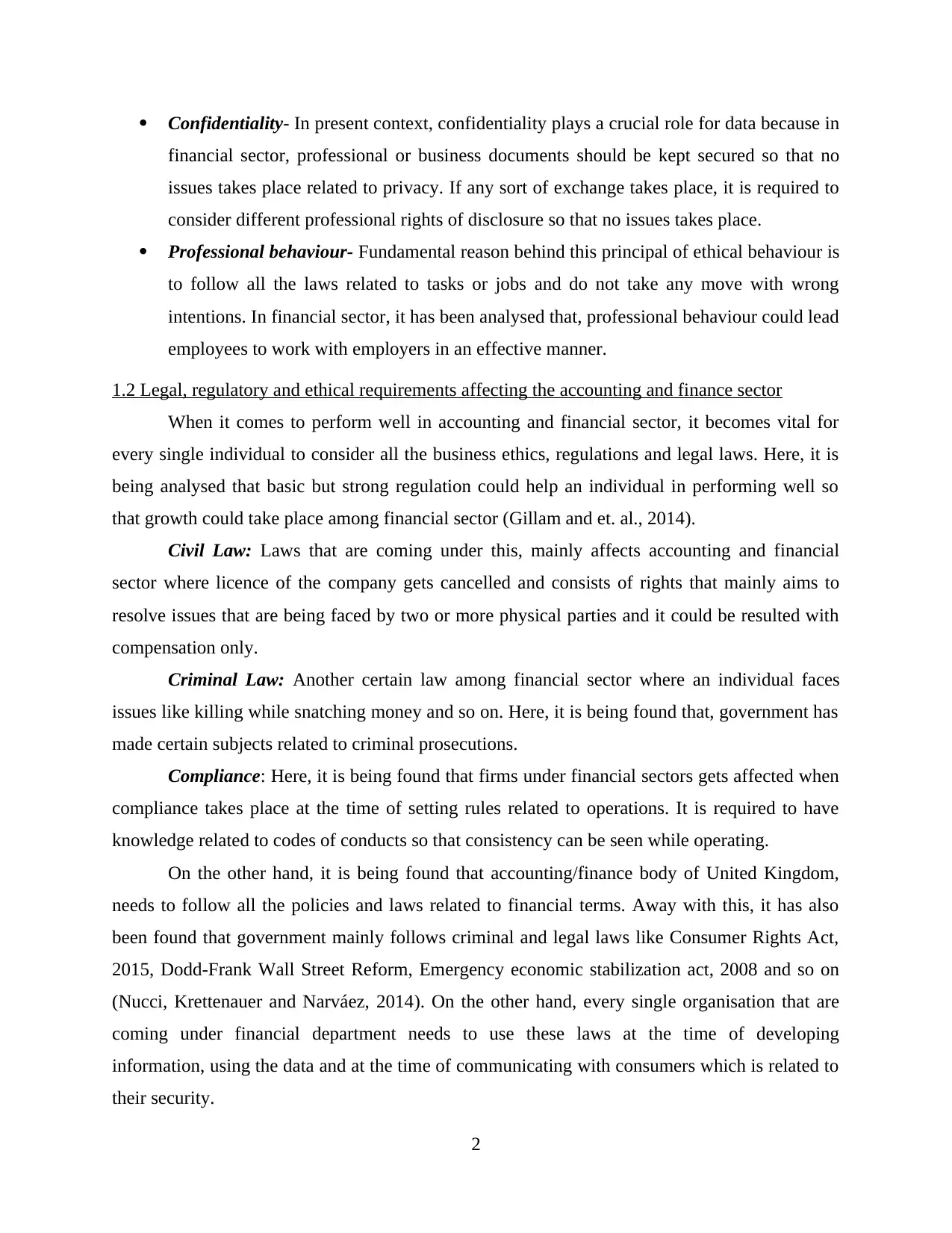
Confidentiality- In present context, confidentiality plays a crucial role for data because in
financial sector, professional or business documents should be kept secured so that no
issues takes place related to privacy. If any sort of exchange takes place, it is required to
consider different professional rights of disclosure so that no issues takes place.
Professional behaviour- Fundamental reason behind this principal of ethical behaviour is
to follow all the laws related to tasks or jobs and do not take any move with wrong
intentions. In financial sector, it has been analysed that, professional behaviour could lead
employees to work with employers in an effective manner.
1.2 Legal, regulatory and ethical requirements affecting the accounting and finance sector
When it comes to perform well in accounting and financial sector, it becomes vital for
every single individual to consider all the business ethics, regulations and legal laws. Here, it is
being analysed that basic but strong regulation could help an individual in performing well so
that growth could take place among financial sector (Gillam and et. al., 2014).
Civil Law: Laws that are coming under this, mainly affects accounting and financial
sector where licence of the company gets cancelled and consists of rights that mainly aims to
resolve issues that are being faced by two or more physical parties and it could be resulted with
compensation only.
Criminal Law: Another certain law among financial sector where an individual faces
issues like killing while snatching money and so on. Here, it is being found that, government has
made certain subjects related to criminal prosecutions.
Compliance: Here, it is being found that firms under financial sectors gets affected when
compliance takes place at the time of setting rules related to operations. It is required to have
knowledge related to codes of conducts so that consistency can be seen while operating.
On the other hand, it is being found that accounting/finance body of United Kingdom,
needs to follow all the policies and laws related to financial terms. Away with this, it has also
been found that government mainly follows criminal and legal laws like Consumer Rights Act,
2015, Dodd-Frank Wall Street Reform, Emergency economic stabilization act, 2008 and so on
(Nucci, Krettenauer and Narváez, 2014). On the other hand, every single organisation that are
coming under financial department needs to use these laws at the time of developing
information, using the data and at the time of communicating with consumers which is related to
their security.
2
financial sector, professional or business documents should be kept secured so that no
issues takes place related to privacy. If any sort of exchange takes place, it is required to
consider different professional rights of disclosure so that no issues takes place.
Professional behaviour- Fundamental reason behind this principal of ethical behaviour is
to follow all the laws related to tasks or jobs and do not take any move with wrong
intentions. In financial sector, it has been analysed that, professional behaviour could lead
employees to work with employers in an effective manner.
1.2 Legal, regulatory and ethical requirements affecting the accounting and finance sector
When it comes to perform well in accounting and financial sector, it becomes vital for
every single individual to consider all the business ethics, regulations and legal laws. Here, it is
being analysed that basic but strong regulation could help an individual in performing well so
that growth could take place among financial sector (Gillam and et. al., 2014).
Civil Law: Laws that are coming under this, mainly affects accounting and financial
sector where licence of the company gets cancelled and consists of rights that mainly aims to
resolve issues that are being faced by two or more physical parties and it could be resulted with
compensation only.
Criminal Law: Another certain law among financial sector where an individual faces
issues like killing while snatching money and so on. Here, it is being found that, government has
made certain subjects related to criminal prosecutions.
Compliance: Here, it is being found that firms under financial sectors gets affected when
compliance takes place at the time of setting rules related to operations. It is required to have
knowledge related to codes of conducts so that consistency can be seen while operating.
On the other hand, it is being found that accounting/finance body of United Kingdom,
needs to follow all the policies and laws related to financial terms. Away with this, it has also
been found that government mainly follows criminal and legal laws like Consumer Rights Act,
2015, Dodd-Frank Wall Street Reform, Emergency economic stabilization act, 2008 and so on
(Nucci, Krettenauer and Narváez, 2014). On the other hand, every single organisation that are
coming under financial department needs to use these laws at the time of developing
information, using the data and at the time of communicating with consumers which is related to
their security.
2
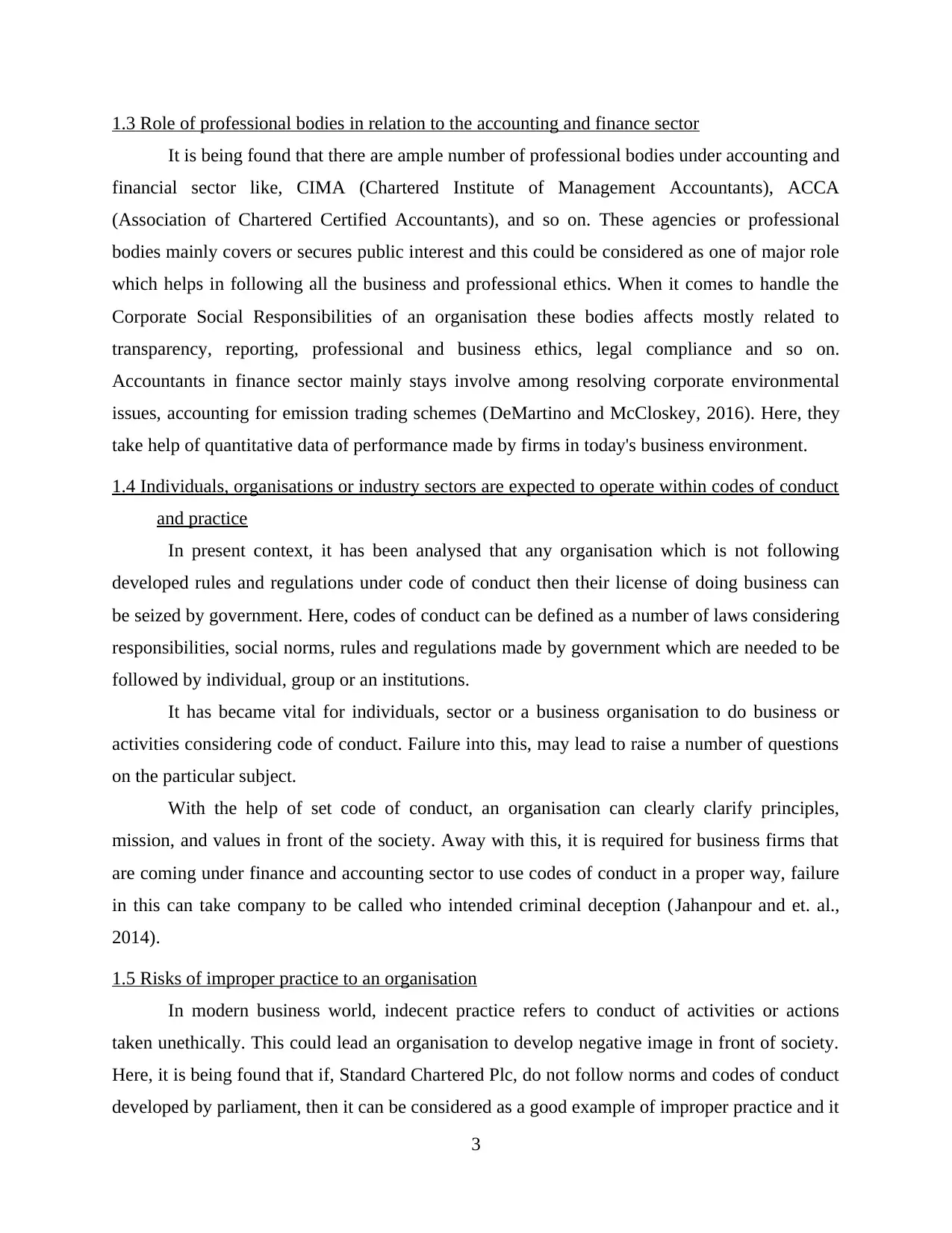
1.3 Role of professional bodies in relation to the accounting and finance sector
It is being found that there are ample number of professional bodies under accounting and
financial sector like, CIMA (Chartered Institute of Management Accountants), ACCA
(Association of Chartered Certified Accountants), and so on. These agencies or professional
bodies mainly covers or secures public interest and this could be considered as one of major role
which helps in following all the business and professional ethics. When it comes to handle the
Corporate Social Responsibilities of an organisation these bodies affects mostly related to
transparency, reporting, professional and business ethics, legal compliance and so on.
Accountants in finance sector mainly stays involve among resolving corporate environmental
issues, accounting for emission trading schemes (DeMartino and McCloskey, 2016). Here, they
take help of quantitative data of performance made by firms in today's business environment.
1.4 Individuals, organisations or industry sectors are expected to operate within codes of conduct
and practice
In present context, it has been analysed that any organisation which is not following
developed rules and regulations under code of conduct then their license of doing business can
be seized by government. Here, codes of conduct can be defined as a number of laws considering
responsibilities, social norms, rules and regulations made by government which are needed to be
followed by individual, group or an institutions.
It has became vital for individuals, sector or a business organisation to do business or
activities considering code of conduct. Failure into this, may lead to raise a number of questions
on the particular subject.
With the help of set code of conduct, an organisation can clearly clarify principles,
mission, and values in front of the society. Away with this, it is required for business firms that
are coming under finance and accounting sector to use codes of conduct in a proper way, failure
in this can take company to be called who intended criminal deception (Jahanpour and et. al.,
2014).
1.5 Risks of improper practice to an organisation
In modern business world, indecent practice refers to conduct of activities or actions
taken unethically. This could lead an organisation to develop negative image in front of society.
Here, it is being found that if, Standard Chartered Plc, do not follow norms and codes of conduct
developed by parliament, then it can be considered as a good example of improper practice and it
3
It is being found that there are ample number of professional bodies under accounting and
financial sector like, CIMA (Chartered Institute of Management Accountants), ACCA
(Association of Chartered Certified Accountants), and so on. These agencies or professional
bodies mainly covers or secures public interest and this could be considered as one of major role
which helps in following all the business and professional ethics. When it comes to handle the
Corporate Social Responsibilities of an organisation these bodies affects mostly related to
transparency, reporting, professional and business ethics, legal compliance and so on.
Accountants in finance sector mainly stays involve among resolving corporate environmental
issues, accounting for emission trading schemes (DeMartino and McCloskey, 2016). Here, they
take help of quantitative data of performance made by firms in today's business environment.
1.4 Individuals, organisations or industry sectors are expected to operate within codes of conduct
and practice
In present context, it has been analysed that any organisation which is not following
developed rules and regulations under code of conduct then their license of doing business can
be seized by government. Here, codes of conduct can be defined as a number of laws considering
responsibilities, social norms, rules and regulations made by government which are needed to be
followed by individual, group or an institutions.
It has became vital for individuals, sector or a business organisation to do business or
activities considering code of conduct. Failure into this, may lead to raise a number of questions
on the particular subject.
With the help of set code of conduct, an organisation can clearly clarify principles,
mission, and values in front of the society. Away with this, it is required for business firms that
are coming under finance and accounting sector to use codes of conduct in a proper way, failure
in this can take company to be called who intended criminal deception (Jahanpour and et. al.,
2014).
1.5 Risks of improper practice to an organisation
In modern business world, indecent practice refers to conduct of activities or actions
taken unethically. This could lead an organisation to develop negative image in front of society.
Here, it is being found that if, Standard Chartered Plc, do not follow norms and codes of conduct
developed by parliament, then it can be considered as a good example of improper practice and it
3
⊘ This is a preview!⊘
Do you want full access?
Subscribe today to unlock all pages.

Trusted by 1+ million students worldwide
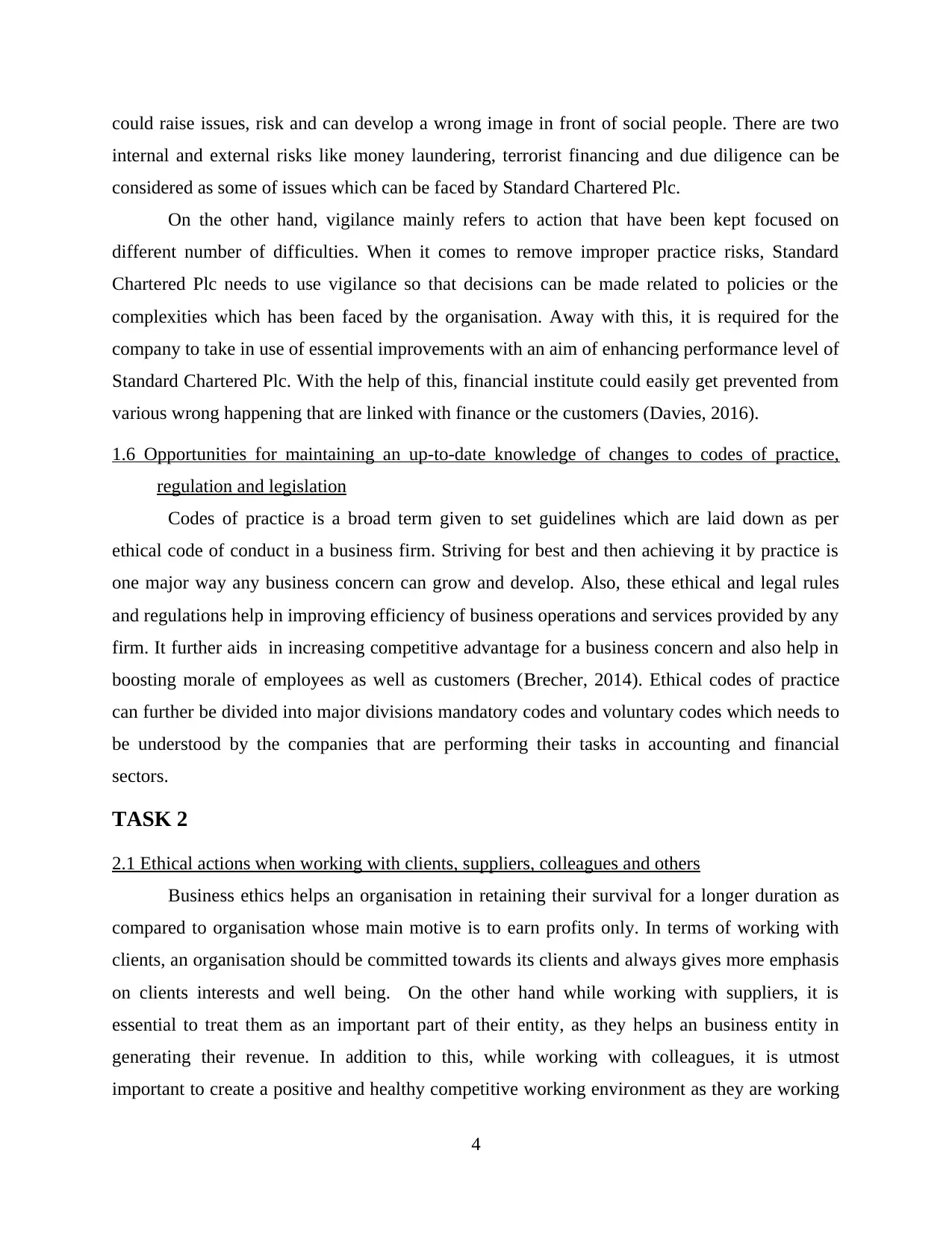
could raise issues, risk and can develop a wrong image in front of social people. There are two
internal and external risks like money laundering, terrorist financing and due diligence can be
considered as some of issues which can be faced by Standard Chartered Plc.
On the other hand, vigilance mainly refers to action that have been kept focused on
different number of difficulties. When it comes to remove improper practice risks, Standard
Chartered Plc needs to use vigilance so that decisions can be made related to policies or the
complexities which has been faced by the organisation. Away with this, it is required for the
company to take in use of essential improvements with an aim of enhancing performance level of
Standard Chartered Plc. With the help of this, financial institute could easily get prevented from
various wrong happening that are linked with finance or the customers (Davies, 2016).
1.6 Opportunities for maintaining an up-to-date knowledge of changes to codes of practice,
regulation and legislation
Codes of practice is a broad term given to set guidelines which are laid down as per
ethical code of conduct in a business firm. Striving for best and then achieving it by practice is
one major way any business concern can grow and develop. Also, these ethical and legal rules
and regulations help in improving efficiency of business operations and services provided by any
firm. It further aids in increasing competitive advantage for a business concern and also help in
boosting morale of employees as well as customers (Brecher, 2014). Ethical codes of practice
can further be divided into major divisions mandatory codes and voluntary codes which needs to
be understood by the companies that are performing their tasks in accounting and financial
sectors.
TASK 2
2.1 Ethical actions when working with clients, suppliers, colleagues and others
Business ethics helps an organisation in retaining their survival for a longer duration as
compared to organisation whose main motive is to earn profits only. In terms of working with
clients, an organisation should be committed towards its clients and always gives more emphasis
on clients interests and well being. On the other hand while working with suppliers, it is
essential to treat them as an important part of their entity, as they helps an business entity in
generating their revenue. In addition to this, while working with colleagues, it is utmost
important to create a positive and healthy competitive working environment as they are working
4
internal and external risks like money laundering, terrorist financing and due diligence can be
considered as some of issues which can be faced by Standard Chartered Plc.
On the other hand, vigilance mainly refers to action that have been kept focused on
different number of difficulties. When it comes to remove improper practice risks, Standard
Chartered Plc needs to use vigilance so that decisions can be made related to policies or the
complexities which has been faced by the organisation. Away with this, it is required for the
company to take in use of essential improvements with an aim of enhancing performance level of
Standard Chartered Plc. With the help of this, financial institute could easily get prevented from
various wrong happening that are linked with finance or the customers (Davies, 2016).
1.6 Opportunities for maintaining an up-to-date knowledge of changes to codes of practice,
regulation and legislation
Codes of practice is a broad term given to set guidelines which are laid down as per
ethical code of conduct in a business firm. Striving for best and then achieving it by practice is
one major way any business concern can grow and develop. Also, these ethical and legal rules
and regulations help in improving efficiency of business operations and services provided by any
firm. It further aids in increasing competitive advantage for a business concern and also help in
boosting morale of employees as well as customers (Brecher, 2014). Ethical codes of practice
can further be divided into major divisions mandatory codes and voluntary codes which needs to
be understood by the companies that are performing their tasks in accounting and financial
sectors.
TASK 2
2.1 Ethical actions when working with clients, suppliers, colleagues and others
Business ethics helps an organisation in retaining their survival for a longer duration as
compared to organisation whose main motive is to earn profits only. In terms of working with
clients, an organisation should be committed towards its clients and always gives more emphasis
on clients interests and well being. On the other hand while working with suppliers, it is
essential to treat them as an important part of their entity, as they helps an business entity in
generating their revenue. In addition to this, while working with colleagues, it is utmost
important to create a positive and healthy competitive working environment as they are working
4
Paraphrase This Document
Need a fresh take? Get an instant paraphrase of this document with our AI Paraphraser
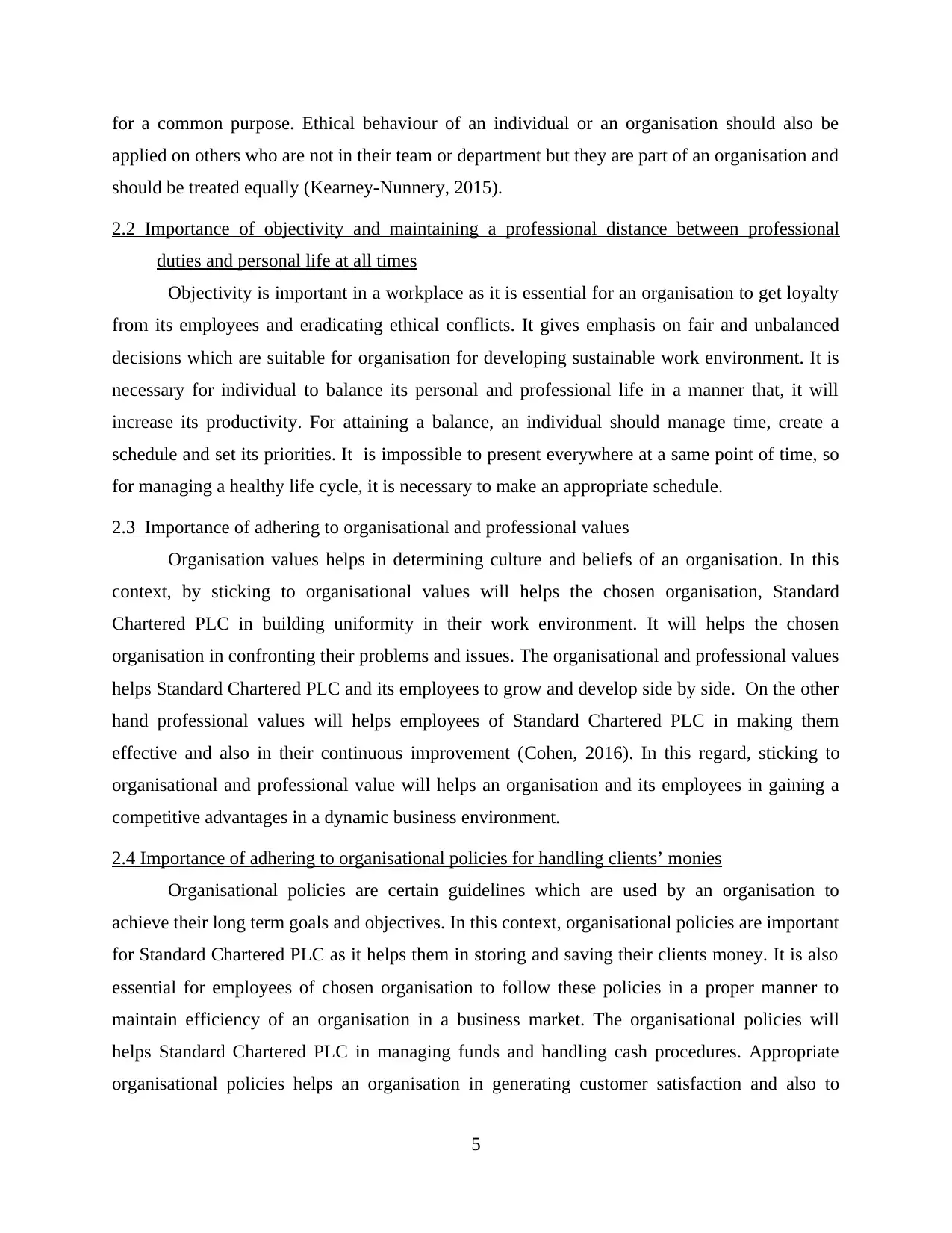
for a common purpose. Ethical behaviour of an individual or an organisation should also be
applied on others who are not in their team or department but they are part of an organisation and
should be treated equally (Kearney-Nunnery, 2015).
2.2 Importance of objectivity and maintaining a professional distance between professional
duties and personal life at all times
Objectivity is important in a workplace as it is essential for an organisation to get loyalty
from its employees and eradicating ethical conflicts. It gives emphasis on fair and unbalanced
decisions which are suitable for organisation for developing sustainable work environment. It is
necessary for individual to balance its personal and professional life in a manner that, it will
increase its productivity. For attaining a balance, an individual should manage time, create a
schedule and set its priorities. It is impossible to present everywhere at a same point of time, so
for managing a healthy life cycle, it is necessary to make an appropriate schedule.
2.3 Importance of adhering to organisational and professional values
Organisation values helps in determining culture and beliefs of an organisation. In this
context, by sticking to organisational values will helps the chosen organisation, Standard
Chartered PLC in building uniformity in their work environment. It will helps the chosen
organisation in confronting their problems and issues. The organisational and professional values
helps Standard Chartered PLC and its employees to grow and develop side by side. On the other
hand professional values will helps employees of Standard Chartered PLC in making them
effective and also in their continuous improvement (Cohen, 2016). In this regard, sticking to
organisational and professional value will helps an organisation and its employees in gaining a
competitive advantages in a dynamic business environment.
2.4 Importance of adhering to organisational policies for handling clients’ monies
Organisational policies are certain guidelines which are used by an organisation to
achieve their long term goals and objectives. In this context, organisational policies are important
for Standard Chartered PLC as it helps them in storing and saving their clients money. It is also
essential for employees of chosen organisation to follow these policies in a proper manner to
maintain efficiency of an organisation in a business market. The organisational policies will
helps Standard Chartered PLC in managing funds and handling cash procedures. Appropriate
organisational policies helps an organisation in generating customer satisfaction and also to
5
applied on others who are not in their team or department but they are part of an organisation and
should be treated equally (Kearney-Nunnery, 2015).
2.2 Importance of objectivity and maintaining a professional distance between professional
duties and personal life at all times
Objectivity is important in a workplace as it is essential for an organisation to get loyalty
from its employees and eradicating ethical conflicts. It gives emphasis on fair and unbalanced
decisions which are suitable for organisation for developing sustainable work environment. It is
necessary for individual to balance its personal and professional life in a manner that, it will
increase its productivity. For attaining a balance, an individual should manage time, create a
schedule and set its priorities. It is impossible to present everywhere at a same point of time, so
for managing a healthy life cycle, it is necessary to make an appropriate schedule.
2.3 Importance of adhering to organisational and professional values
Organisation values helps in determining culture and beliefs of an organisation. In this
context, by sticking to organisational values will helps the chosen organisation, Standard
Chartered PLC in building uniformity in their work environment. It will helps the chosen
organisation in confronting their problems and issues. The organisational and professional values
helps Standard Chartered PLC and its employees to grow and develop side by side. On the other
hand professional values will helps employees of Standard Chartered PLC in making them
effective and also in their continuous improvement (Cohen, 2016). In this regard, sticking to
organisational and professional value will helps an organisation and its employees in gaining a
competitive advantages in a dynamic business environment.
2.4 Importance of adhering to organisational policies for handling clients’ monies
Organisational policies are certain guidelines which are used by an organisation to
achieve their long term goals and objectives. In this context, organisational policies are important
for Standard Chartered PLC as it helps them in storing and saving their clients money. It is also
essential for employees of chosen organisation to follow these policies in a proper manner to
maintain efficiency of an organisation in a business market. The organisational policies will
helps Standard Chartered PLC in managing funds and handling cash procedures. Appropriate
organisational policies helps an organisation in generating customer satisfaction and also to
5
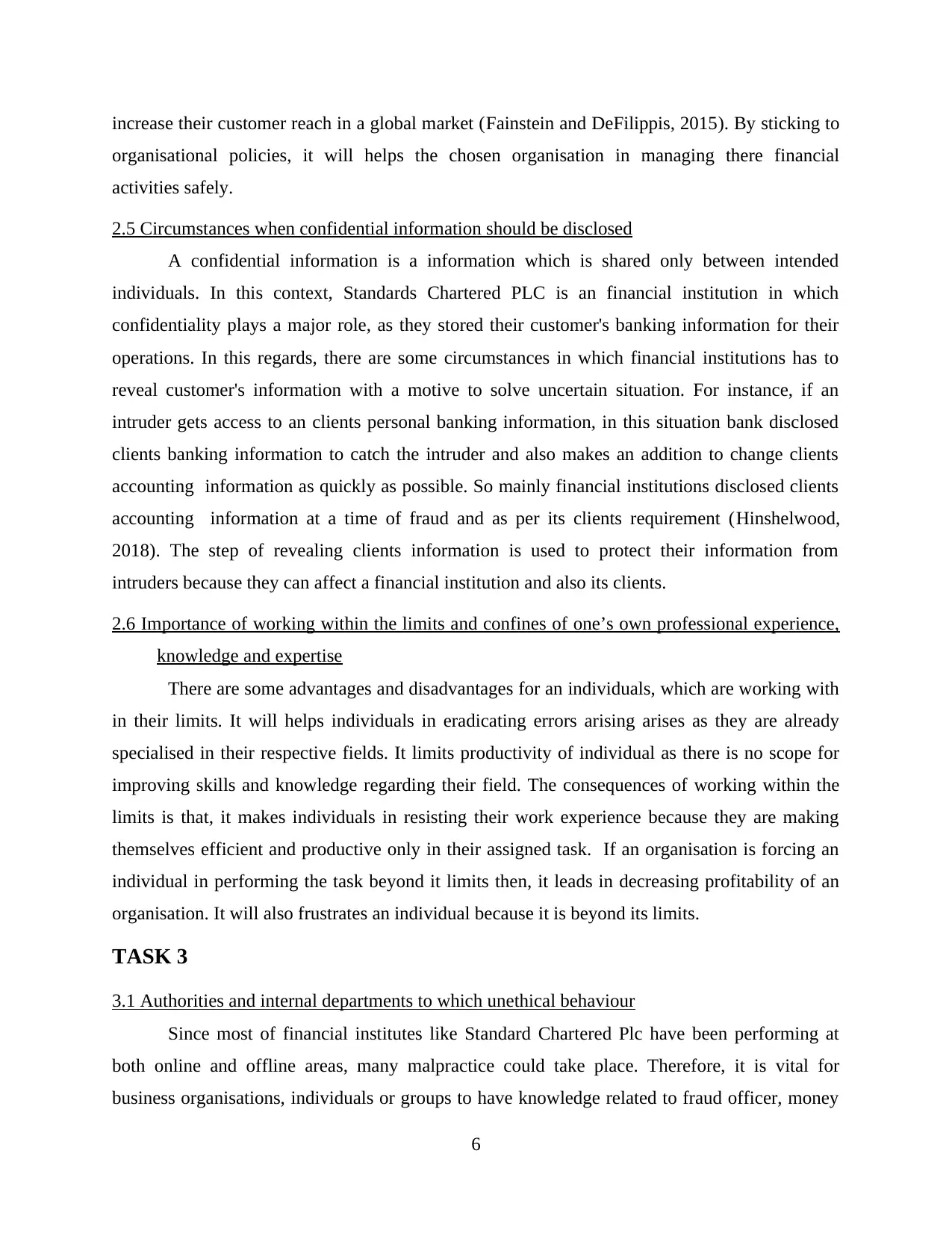
increase their customer reach in a global market (Fainstein and DeFilippis, 2015). By sticking to
organisational policies, it will helps the chosen organisation in managing there financial
activities safely.
2.5 Circumstances when confidential information should be disclosed
A confidential information is a information which is shared only between intended
individuals. In this context, Standards Chartered PLC is an financial institution in which
confidentiality plays a major role, as they stored their customer's banking information for their
operations. In this regards, there are some circumstances in which financial institutions has to
reveal customer's information with a motive to solve uncertain situation. For instance, if an
intruder gets access to an clients personal banking information, in this situation bank disclosed
clients banking information to catch the intruder and also makes an addition to change clients
accounting information as quickly as possible. So mainly financial institutions disclosed clients
accounting information at a time of fraud and as per its clients requirement (Hinshelwood,
2018). The step of revealing clients information is used to protect their information from
intruders because they can affect a financial institution and also its clients.
2.6 Importance of working within the limits and confines of one’s own professional experience,
knowledge and expertise
There are some advantages and disadvantages for an individuals, which are working with
in their limits. It will helps individuals in eradicating errors arising arises as they are already
specialised in their respective fields. It limits productivity of individual as there is no scope for
improving skills and knowledge regarding their field. The consequences of working within the
limits is that, it makes individuals in resisting their work experience because they are making
themselves efficient and productive only in their assigned task. If an organisation is forcing an
individual in performing the task beyond it limits then, it leads in decreasing profitability of an
organisation. It will also frustrates an individual because it is beyond its limits.
TASK 3
3.1 Authorities and internal departments to which unethical behaviour
Since most of financial institutes like Standard Chartered Plc have been performing at
both online and offline areas, many malpractice could take place. Therefore, it is vital for
business organisations, individuals or groups to have knowledge related to fraud officer, money
6
organisational policies, it will helps the chosen organisation in managing there financial
activities safely.
2.5 Circumstances when confidential information should be disclosed
A confidential information is a information which is shared only between intended
individuals. In this context, Standards Chartered PLC is an financial institution in which
confidentiality plays a major role, as they stored their customer's banking information for their
operations. In this regards, there are some circumstances in which financial institutions has to
reveal customer's information with a motive to solve uncertain situation. For instance, if an
intruder gets access to an clients personal banking information, in this situation bank disclosed
clients banking information to catch the intruder and also makes an addition to change clients
accounting information as quickly as possible. So mainly financial institutions disclosed clients
accounting information at a time of fraud and as per its clients requirement (Hinshelwood,
2018). The step of revealing clients information is used to protect their information from
intruders because they can affect a financial institution and also its clients.
2.6 Importance of working within the limits and confines of one’s own professional experience,
knowledge and expertise
There are some advantages and disadvantages for an individuals, which are working with
in their limits. It will helps individuals in eradicating errors arising arises as they are already
specialised in their respective fields. It limits productivity of individual as there is no scope for
improving skills and knowledge regarding their field. The consequences of working within the
limits is that, it makes individuals in resisting their work experience because they are making
themselves efficient and productive only in their assigned task. If an organisation is forcing an
individual in performing the task beyond it limits then, it leads in decreasing profitability of an
organisation. It will also frustrates an individual because it is beyond its limits.
TASK 3
3.1 Authorities and internal departments to which unethical behaviour
Since most of financial institutes like Standard Chartered Plc have been performing at
both online and offline areas, many malpractice could take place. Therefore, it is vital for
business organisations, individuals or groups to have knowledge related to fraud officer, money
6
⊘ This is a preview!⊘
Do you want full access?
Subscribe today to unlock all pages.

Trusted by 1+ million students worldwide
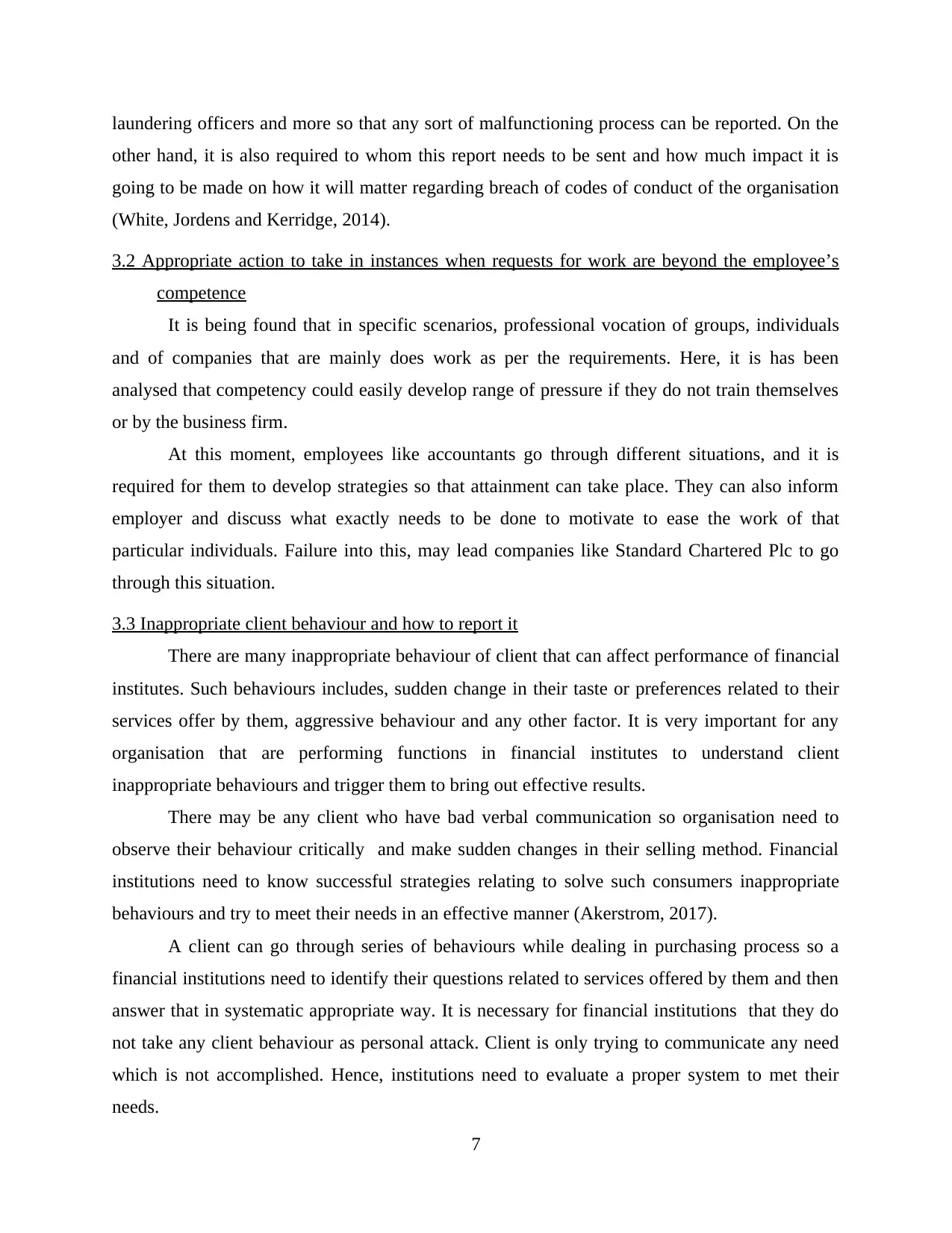
laundering officers and more so that any sort of malfunctioning process can be reported. On the
other hand, it is also required to whom this report needs to be sent and how much impact it is
going to be made on how it will matter regarding breach of codes of conduct of the organisation
(White, Jordens and Kerridge, 2014).
3.2 Appropriate action to take in instances when requests for work are beyond the employee’s
competence
It is being found that in specific scenarios, professional vocation of groups, individuals
and of companies that are mainly does work as per the requirements. Here, it is has been
analysed that competency could easily develop range of pressure if they do not train themselves
or by the business firm.
At this moment, employees like accountants go through different situations, and it is
required for them to develop strategies so that attainment can take place. They can also inform
employer and discuss what exactly needs to be done to motivate to ease the work of that
particular individuals. Failure into this, may lead companies like Standard Chartered Plc to go
through this situation.
3.3 Inappropriate client behaviour and how to report it
There are many inappropriate behaviour of client that can affect performance of financial
institutes. Such behaviours includes, sudden change in their taste or preferences related to their
services offer by them, aggressive behaviour and any other factor. It is very important for any
organisation that are performing functions in financial institutes to understand client
inappropriate behaviours and trigger them to bring out effective results.
There may be any client who have bad verbal communication so organisation need to
observe their behaviour critically and make sudden changes in their selling method. Financial
institutions need to know successful strategies relating to solve such consumers inappropriate
behaviours and try to meet their needs in an effective manner (Akerstrom, 2017).
A client can go through series of behaviours while dealing in purchasing process so a
financial institutions need to identify their questions related to services offered by them and then
answer that in systematic appropriate way. It is necessary for financial institutions that they do
not take any client behaviour as personal attack. Client is only trying to communicate any need
which is not accomplished. Hence, institutions need to evaluate a proper system to met their
needs.
7
other hand, it is also required to whom this report needs to be sent and how much impact it is
going to be made on how it will matter regarding breach of codes of conduct of the organisation
(White, Jordens and Kerridge, 2014).
3.2 Appropriate action to take in instances when requests for work are beyond the employee’s
competence
It is being found that in specific scenarios, professional vocation of groups, individuals
and of companies that are mainly does work as per the requirements. Here, it is has been
analysed that competency could easily develop range of pressure if they do not train themselves
or by the business firm.
At this moment, employees like accountants go through different situations, and it is
required for them to develop strategies so that attainment can take place. They can also inform
employer and discuss what exactly needs to be done to motivate to ease the work of that
particular individuals. Failure into this, may lead companies like Standard Chartered Plc to go
through this situation.
3.3 Inappropriate client behaviour and how to report it
There are many inappropriate behaviour of client that can affect performance of financial
institutes. Such behaviours includes, sudden change in their taste or preferences related to their
services offer by them, aggressive behaviour and any other factor. It is very important for any
organisation that are performing functions in financial institutes to understand client
inappropriate behaviours and trigger them to bring out effective results.
There may be any client who have bad verbal communication so organisation need to
observe their behaviour critically and make sudden changes in their selling method. Financial
institutions need to know successful strategies relating to solve such consumers inappropriate
behaviours and try to meet their needs in an effective manner (Akerstrom, 2017).
A client can go through series of behaviours while dealing in purchasing process so a
financial institutions need to identify their questions related to services offered by them and then
answer that in systematic appropriate way. It is necessary for financial institutions that they do
not take any client behaviour as personal attack. Client is only trying to communicate any need
which is not accomplished. Hence, institutions need to evaluate a proper system to met their
needs.
7
Paraphrase This Document
Need a fresh take? Get an instant paraphrase of this document with our AI Paraphraser
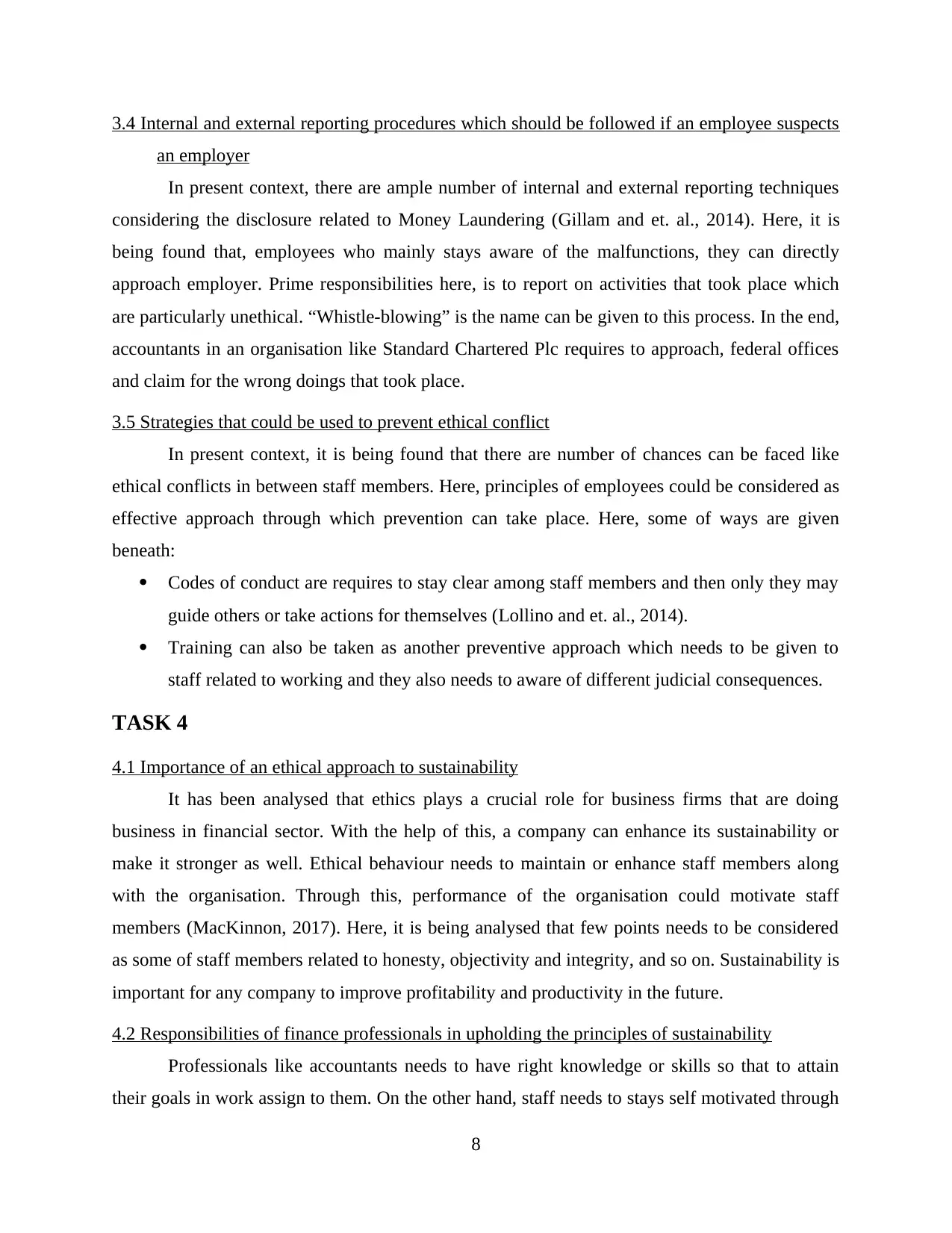
3.4 Internal and external reporting procedures which should be followed if an employee suspects
an employer
In present context, there are ample number of internal and external reporting techniques
considering the disclosure related to Money Laundering (Gillam and et. al., 2014). Here, it is
being found that, employees who mainly stays aware of the malfunctions, they can directly
approach employer. Prime responsibilities here, is to report on activities that took place which
are particularly unethical. “Whistle-blowing” is the name can be given to this process. In the end,
accountants in an organisation like Standard Chartered Plc requires to approach, federal offices
and claim for the wrong doings that took place.
3.5 Strategies that could be used to prevent ethical conflict
In present context, it is being found that there are number of chances can be faced like
ethical conflicts in between staff members. Here, principles of employees could be considered as
effective approach through which prevention can take place. Here, some of ways are given
beneath:
Codes of conduct are requires to stay clear among staff members and then only they may
guide others or take actions for themselves (Lollino and et. al., 2014).
Training can also be taken as another preventive approach which needs to be given to
staff related to working and they also needs to aware of different judicial consequences.
TASK 4
4.1 Importance of an ethical approach to sustainability
It has been analysed that ethics plays a crucial role for business firms that are doing
business in financial sector. With the help of this, a company can enhance its sustainability or
make it stronger as well. Ethical behaviour needs to maintain or enhance staff members along
with the organisation. Through this, performance of the organisation could motivate staff
members (MacKinnon, 2017). Here, it is being analysed that few points needs to be considered
as some of staff members related to honesty, objectivity and integrity, and so on. Sustainability is
important for any company to improve profitability and productivity in the future.
4.2 Responsibilities of finance professionals in upholding the principles of sustainability
Professionals like accountants needs to have right knowledge or skills so that to attain
their goals in work assign to them. On the other hand, staff needs to stays self motivated through
8
an employer
In present context, there are ample number of internal and external reporting techniques
considering the disclosure related to Money Laundering (Gillam and et. al., 2014). Here, it is
being found that, employees who mainly stays aware of the malfunctions, they can directly
approach employer. Prime responsibilities here, is to report on activities that took place which
are particularly unethical. “Whistle-blowing” is the name can be given to this process. In the end,
accountants in an organisation like Standard Chartered Plc requires to approach, federal offices
and claim for the wrong doings that took place.
3.5 Strategies that could be used to prevent ethical conflict
In present context, it is being found that there are number of chances can be faced like
ethical conflicts in between staff members. Here, principles of employees could be considered as
effective approach through which prevention can take place. Here, some of ways are given
beneath:
Codes of conduct are requires to stay clear among staff members and then only they may
guide others or take actions for themselves (Lollino and et. al., 2014).
Training can also be taken as another preventive approach which needs to be given to
staff related to working and they also needs to aware of different judicial consequences.
TASK 4
4.1 Importance of an ethical approach to sustainability
It has been analysed that ethics plays a crucial role for business firms that are doing
business in financial sector. With the help of this, a company can enhance its sustainability or
make it stronger as well. Ethical behaviour needs to maintain or enhance staff members along
with the organisation. Through this, performance of the organisation could motivate staff
members (MacKinnon, 2017). Here, it is being analysed that few points needs to be considered
as some of staff members related to honesty, objectivity and integrity, and so on. Sustainability is
important for any company to improve profitability and productivity in the future.
4.2 Responsibilities of finance professionals in upholding the principles of sustainability
Professionals like accountants needs to have right knowledge or skills so that to attain
their goals in work assign to them. On the other hand, staff needs to stays self motivated through
8
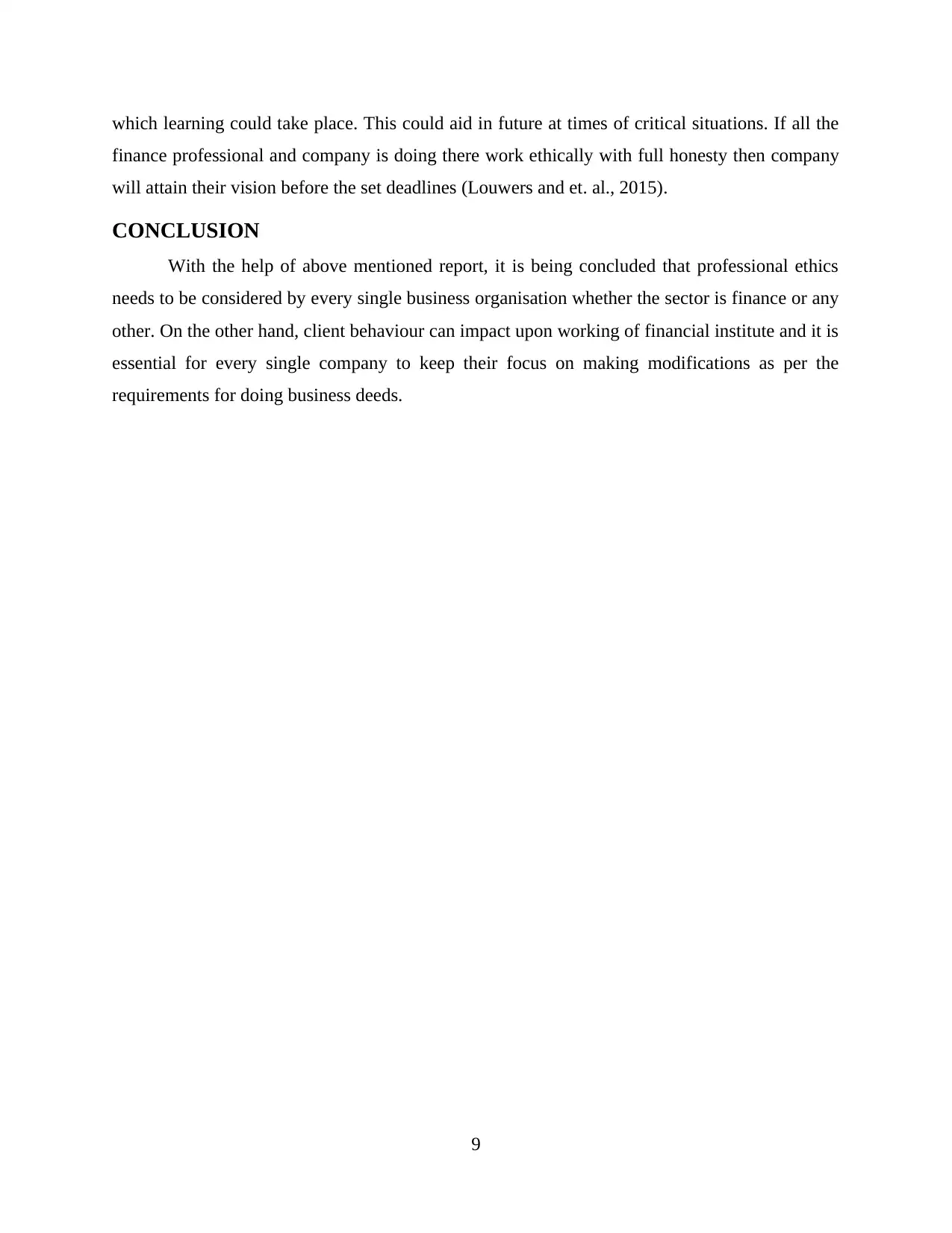
which learning could take place. This could aid in future at times of critical situations. If all the
finance professional and company is doing there work ethically with full honesty then company
will attain their vision before the set deadlines (Louwers and et. al., 2015).
CONCLUSION
With the help of above mentioned report, it is being concluded that professional ethics
needs to be considered by every single business organisation whether the sector is finance or any
other. On the other hand, client behaviour can impact upon working of financial institute and it is
essential for every single company to keep their focus on making modifications as per the
requirements for doing business deeds.
9
finance professional and company is doing there work ethically with full honesty then company
will attain their vision before the set deadlines (Louwers and et. al., 2015).
CONCLUSION
With the help of above mentioned report, it is being concluded that professional ethics
needs to be considered by every single business organisation whether the sector is finance or any
other. On the other hand, client behaviour can impact upon working of financial institute and it is
essential for every single company to keep their focus on making modifications as per the
requirements for doing business deeds.
9
⊘ This is a preview!⊘
Do you want full access?
Subscribe today to unlock all pages.

Trusted by 1+ million students worldwide
1 out of 13
Related Documents
Your All-in-One AI-Powered Toolkit for Academic Success.
+13062052269
info@desklib.com
Available 24*7 on WhatsApp / Email
![[object Object]](/_next/static/media/star-bottom.7253800d.svg)
Unlock your academic potential
Copyright © 2020–2026 A2Z Services. All Rights Reserved. Developed and managed by ZUCOL.





